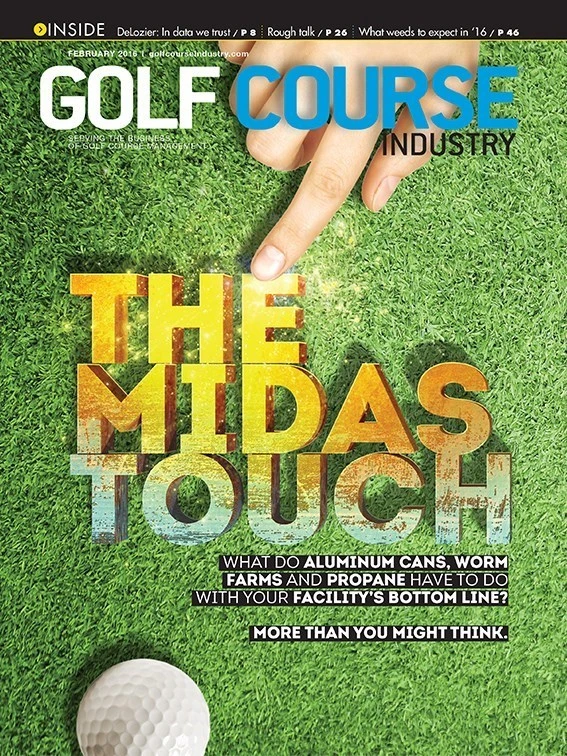Nothing affects golf course management like weather. Mostly, superintendents modify conditions the best we can during times less than ideal for the golf turf we are managing. From overwhelming heat and humidity to bone-crunching cold, the struggle is to get through it until normal weather returns. Given that, the conversations about climate change in the news almost daily are serious ones for all of society. But the threat of change is especially serious for those of us with the charge of managing around and through it.
The question actually may be, “How much of the change is permanent and caused by human activities?” Up to this point, I have been a climate agnostic. That is probably because in my 70 years on this earth I have seen weather extremes many times. Add to that the stories from parents and grandparents about weather extremes they lived through, especially in the mid-1930s, and you gain some skepticism about the doomsday theories bantered about these days.
During my 40 years in golf course management, there were wide swings in the weather, but only lately has there been such widespread publicity about the weather extremes. Some of that reporting is based on science and fact, and some of it is not. Opinions vary and I see both sides. Experience, however, has taught me there is wisdom in hedging your bets, especially when it comes to an issue like climate change. Worst-case scenarios can happen and this is one where we need to be on the right side.
Opinions are shaped by what we see and experience close to home. It was probably a decade or so ago that a ban on phosphorus in turf fertilizers was passed. This aggravated many in our business because, as admitted via a DNR pie chart, turf (home lawns, golf courses, parks, sports fields, cemeteries, etc.) accounted for less than 5 percent of the phosphorus leeching into our lakes and streams. We had some exceptions – soil testing recommendations and new seeding, for example – but the target was turf. What about the agricultural lands and the runoff of manure? What about soil moved off construction sites onto roads and then into lakes and streams? What about negligent leaf pickup on streets in and around lakes and streams? I’d guess that we lacked the political influence other target sources of phosphorus were able to generate. As an aside, I am not aware of any increase in water quality since the P ban on turf fertilizers.
When you lack political clout, science is a good way to respond. So a graduate student at the UW-Madison designed an experiment to look at runoff from turf as opposed to native plants. In a bermed rain garden situation, turfgrass reduced runoff and increased percolation to the same degree as prairie plants. In unbermed plots, the sodded turf performed better than the prairie plants. So much for the proof of runoff from grassed areas like golf courses.
What’s the point? The recently agreed to Paris climate agreement allows some countries to continue to operate for decades without reducing the pollution they produce, while in this country industries are closed and jobs taken away because of politicians and bureaucrats. It isn’t unlike the P ban in turf fertilizers in Wisconsin.
There is no denying it was a tough year for many in the U.S. The frightening scenes of drought and fires out West would impact anybody. The extensive flooding in the Midwest during early winter gave all of us pause. I am not sure, however, that those tragic events are evidence of global warming. In our town we had a nice year. Precipitation was a little above normal, temperatures were a little cooler and we are short of snow, though, not by much. Some courses in our area were reporting scores into December. Our state had a near record year for crops and statewide saw a growing season (June-September) only 0.1 degrees above normal.
Our world was normal, once again. Well, almost normal. Our golf course is located on Lake Mendota, a 10,000-acre lake that is one of five in and around Madison. As I write this, it still hasn’t frozen over. The hard water fishermen and the ice boaters are distraught. We are way past the “ice-on” date and some scientists wonder if Mendota will freeze at all this winter. It seems impossible, given how far north we are. Years ago, limnologists determined the “ice-out” date was when they could row a boat from campus on the south shore to the village of Maple Bluff on the north shore to deliver a case of beer to friends. This year, they just might be able to do that all winter long. Now I wonder if something is going on.
So, like with so many things, we have to turn to legitimate science to define the problem and find a course of action. We cannot wait too long.

Explore the February 2016 Issue
Check out more from this issue and find your next story to read.
Latest from Golf Course Industry
- GCSAA’s Health in Action 5K/2K reaches fundraising goal
- Landscapes Golf Management to participate in data analyzation initiative
- Reel Turf Techs: Carl Michael
- Atlanta Athletic Club approves funding for master plan
- Maximizing Cultural Practices and Agronomic Benefits with Minimal Surface Disruption
- Real Answers about Spray Nozzle Choices
- From the Course to the Factory: How Customer Insights Drive Innovation
- New & Proven Enzyme Strategies for Sprayable Thatch Management





